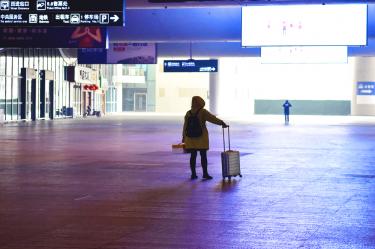China yesterday locked down two major cities in a province at the center of a deadly coronavirus outbreak, banning airplanes and trains from leaving in an unprecedented move aimed at containing the disease, which has already spread to other countries.
The respiratory virus has claimed 17 lives since emerging from a seafood and animal market in Wuhan, infected hundreds of other people nationwide and been detected as far away as the US.
Residents in Wuhan, a major port city in Hubei Province with a population of 11 million, were told not to leave “without a special reason,” with the order backed by a transport shutdown.
Trains and flights out of Wuhan were indefinitely suspended and tollways on roads out of the city were closed, leading to fear and panic for those trapped.
Hours later, authorities in neighboring Huanggang announced that public transportation and train services would be suspended at midnight, while people were told to not leave the city of 7.5 million.
All of Huanggang’s movie theaters and Internet cafes, as well as the central market, were to shut down.
A third city, Ezhou, with a population of 1.1 million, announced that its train station had been temporarily closed earlier in the day.
Wuhan’s train station and airport, which should have been packed with people traveling for holiday family reunions, were almost empty except for workers yesterday afternoon.
Few people were seen in the streets of the city and all were wearing masks.
More than 570 people have been infected with the virus across China — with most cases in Wuhan, where a seafood market that illegally sold wild animals has been identified as the likely epicenter of the outbreak.
The coronavirus has caused alarm because of its similarity to SARS, which killed hundreds of people worldwide in 2002 and 2003. Like SARS, it can be passed among people through the respiratory tract.
The first case of the new virus was confirmed on Dec. 31, and it has since been detected in Taiwan, Japan, Hong Kong, Macau, South Korea, Thailand and the US.
The 17 people who died in China were aged 48 to 89 and had pre-existing health conditions, Chinese health authorities said yesterday.
The WHO on Wednesday delayed a decision on whether to declare a global health emergency — a rare instrument used only for the worst outbreaks.
The emergency committee was to meet again yesterday after its chair, Didier Houssin, said that the experts were split over declaring an emergency.
WHO Secretary-General Tedros Adhanom Ghebreyesus said that “more information” was needed, but he also praised China’s “very, very strong measures” that would help control the epidemic and “minimize the chances of this outbreak spreading internationally.”
Chinese state media quoted Wuhan’s special disease command center as saying that the quarantine measures are meant to “effectively cut off the virus spread, resolutely curb the outbreak and guarantee the people’s health and safety.”
While departures were banned, trains and airplanes were still allowed into the city, with the tourism and culture department canceling all group tours until Feb. 8, state media reported.
Wuhan has also canceled large public events for the holiday, which starts today.
Animals are suspected to be the primary source of the outbreak, with Chinese health officials saying that the virus originated from the market, where wild animals were illegally sold.
Studies published this week suggested that the virus might have originally come from bats or snakes.
The WHO has confirmed that the virus can be transmitted between people, at least those in close contact. Chinese health officials warned it could mutate and spread further.
“There are many unknowns to address in this event, including clinical severity and the true extent and nature of disease transmission,” said Michael Ryan, head of the WHO Health Emergencies Programme.
Chinese authorities yesterday reported dozens of new infections, bringing the confirmed total to 571.
Nearly 2,000 Taiwanese businesspeople were in Wuhan, but most have returned to Taiwan, Wuhan Taiwanese Business Association chairman Lin Chi-chang (林志昶) said yesterday, after the Wuhan City Government stopped all transport systems and Taiwanese airlines suspended flights to the city.
Those staying in Wuhan should reduce their outdoor activities, former association chairman Yu Ming-chim (余明進) said.
Additional reporting by CNA
Source: Taipei Times - 2020/01/24





















